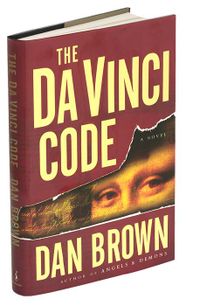As much literary merit as the Ikea catalogue
 While working in Brisbane for the past week, I kept myself entertained with The Da Vinci Code each evening, if only to see what all the fuss was about.
While working in Brisbane for the past week, I kept myself entertained with The Da Vinci Code each evening, if only to see what all the fuss was about. Put briefly, this book is proof that predicting the book-buying market is a bit like predicting the stockmarket. Impossible, in other words.
It's badly written, breaks every single rule anyone who ever attended a writing class ever learnt (like 'show, not tell' and 'if someone shouts, don't say said' etc). The plot devices are blindingly obvious to those with even a modicum of intelligence (how an experienced cryptographer missed the simple anagram early on is ridiculous). And yet.
It's curiously addictive. Brown knows his history. This is not to say the history is accurate. Rather, it's an admission on my part that to twist it in such an accomplished way requires real knowledge and skill. On Wednesday I turned up bleary-eyed and foggy-brained to a contracts review meeting - after sitting up until nearly 2 am the night before reading the bloody thing. Discretion was clearly the better part of valour and I owned up, only to see knowing nods from around the table. We stopped clocking our hours and spent the next forty minutes trying to work out why everyone present (a mixture of equally astute lawyers and businesspeople) reacted so similarly. And got precisely nowhere.
I spent some more time thinking on the flight home this evening, and have come to the conclusion that the book is effective because it plays on modern fears and suppositions that we aren't getting the full story, not only from the media, but from governments, corporations and statutory bodies as well. People I know whinge constantly about the feeling that they're drowning in a sea of spin, that nothing and no-one is real anymore. Brown taps into this common sensation with aplomb, much as that other great conspiracy show, The X-Files managed to do. And yet.
The X-Files was almost uniformly excellent - well acted, well scripted, blessed with stunningly cinematic production values. The Da Vinci Code is - at best - uneven, at least to my eye.
Thoughts on the phenomenon, anyone?
4 Comments:
I read it a couple of years back, also trying to figure the hype.
It's the only time I've ever had more than 1 person comment on a book I was carrying 'round, and its the only time I've ever noticed people reading the same book as me.
Haven't read it, I must admit, and don't currently intend to. I have more 'worthy' books in my pile of to-be-reads. Presently reading Luke Slattery's Dating Aphrodite'. Very good.
I read it and loved it! Yes, it's not exceptionally well-written but it's captivating stuff all the same. Reading it has surely inspired many people to dig deeper into the history behind the book. You're probably right in putting it down to our attraction to conspiracy theories (along the lines of 'who really shot JFK', SIEV X and global warming sceptics like Michael Crichton.)
When it comes to human history, I've always favoured cock-up over conspiracy, on the grounds that keeping something major (the basis of most conspiracy theories) secret for so long is well nigh impossible, especially when the secret has become known to many people.
That said, Christianity was very different from the pagan religious traditions preceding it, especially on an ideological level. I think it was Robert Graves - of I Claudius fame, an eminent classicist and translator - who pointed out that the Mariolitry in Catholic Christianity had its origins in ancient Goddess worship. I suppose the pagans had to be compensated in some way for adopting the austere attitudes of Christianity in preference to their own freewheeling traditions.
A visit to a museum well-stocked with Roman antiquities is usually a bit of a shock to the system if you're even slightly prudish - penis doorknockers, glassware shaped like female genitalia, bestiality, more positions than the karma sutra. There's probably a bit in Brown's arguments about the religious views of human sexuality held by the Abrahamic faiths - Islam, Judaism and Christianity. The pagan Romans seemed rather more, err, relaxed in these matters.
Post a Comment
<< Home